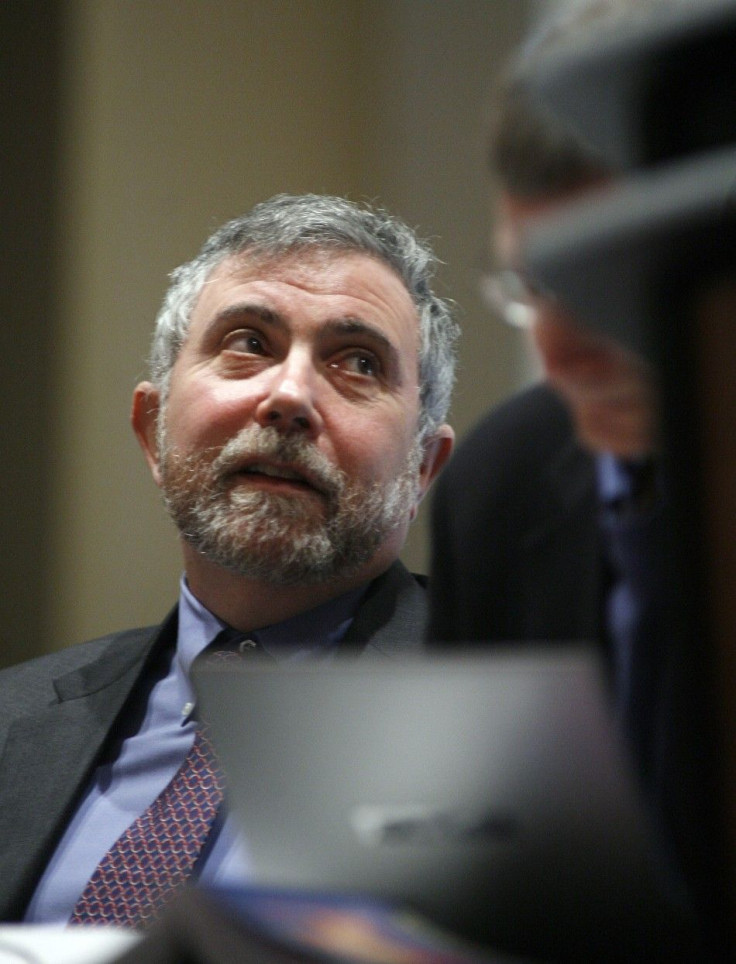What Do Prominent Economists Say About Coronavirus? Paul Krugman, Robert Shiller, Joseph Stiglitz Comment

KEY POINTS
- Trump says he believes in the V-curve for the business cycle
- Paul Krugman says investors are in a panic
- Joseph Stiglitz says relieve measure contemplated by Congress are inadequate and may be misguided
As President Trump and his chief economic adviser tried to reassure Americans the economy will suffer no permanent damage from the coronavirus outbreak, famed economists disagreed on whether COVID-19 would lead to a major recession and whether the aid packages working their way through Congress actually would mitigate the impact.
The number of confirmed coronavirus infections in the U.S. topped 14,000 early Friday, with at least 205 deaths. Worldwide, the death toll exceeded 10,000 with more than 246,000 cases confirmed.
Trump said Thursday he expects the economy will rebound swiftly once the crisis passes.
“I believe in the V-curve. When this is defeated … I think it will go up very rapidly, the economy, and get it back to where it was and beyond,” Trump said Thursday.
When this virus is defeated, our great American economy will bounce back rapidly. pic.twitter.com/812JGjlDIm
— The White House 45 Archived (@WhiteHouse45) March 19, 2020
A Gallup poll indicates only 11% of Americans report their employers have cut jobs, reduced hours or frozen hiring. But for those making less than $36,000 annually, 20% said they’ve seen reductions. Nearly a third said their employers offer no sick leave. That percentage approaches two-thirds in the lowest tax brackets. The latest coronavirus relief bill mandated sick leave for 20% of the workforce but excluded employers with more than 500 employees.
“There is much uncertainty about the coronavirus and the effect it will have in the future, but early health and economic indicators are bleak. Americans' worries are mounting, and their confidence in the U.S. economy has fallen dramatically,” Gallup said.
Nobel-laureate economist and Princeton Professor Paul Krugman said Friday investors are in a “full-blown panic,” evidenced by rising bond yields, he said.
OK, it's now becoming clear that rising bond yields don't reflect optimism about stimulus; they reflect full-blown financial panic, with investors selling everything to accumulate cash https://t.co/LthJ6f5eFe
— Paul Krugman (@paulkrugman) March 18, 2020
Fellow Nobel laureate Robert Shiller said the situation is highly volatile and because the stock market plunge was triggered by outside forces, history may not inform what will happen in the future.
“We could be vulnerable to more drops,” Shiller told Reuters. “It’s a high volatility period. I would advise people not to take any extreme measures. Don’t think it’s the time to sell out completely, but also, don’t conclude it’s a big buying opportunity and push into leveraged positions in the market.”
Asked about the global economy, Schiller said: “One thing being revealed is what happens during quarantines, if people just stay home. Businesses depend on a steady flow of commerce, and they’re just not prepared for an interruption like this.
“I call this a co-epidemic: One is the coronavirus, and the other is like a narrative epidemic, about our confidence and outlook for the economy. That’s a new one, it’s happening fast, and it’s very contagious. Everyone’s talking about this.”
He worried central banks will not have the ability to goose a comeback because interest rates already are so low.
More than $112 billion in coronavirus relief measures already have been signed into law, and the Senate is working on a more than $1 trillion package that would put money directly into taxpayers’ hands, perhaps $1,000 to $1,200 for each adult and $500 for each child.
Columbia University economist Joseph Stiglitz said the amounts being considered are inadequate.
“If, as many epidemiologists say, this is going to last for several months, there will have to be a second and third and fourth [round] of those checks. If we don’t do that, people whose income is collapsed, people who are left unemployed — remember, we have the worst unemployment system of any of the advanced countries — all these people … are not going to be able to pay their bills, and we’ll have a cascade of problems,” Stiglitz told Democracy Now.
He added there was no guarantee private banks would follow Fannie Mae and Freddie Mac in suspending foreclosures.
Stiglitz said it would be a mistake to give money to airlines and cruise ships (the airlines have asked for $50 billion).
“The airlines had a huge bonanza from the tax bill of 2017. And rather than use that money to build up buffers in times of emergency, they had billions and billions of share buybacks,” he said.
© Copyright IBTimes 2024. All rights reserved.





















